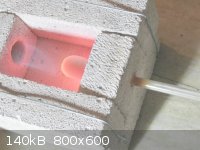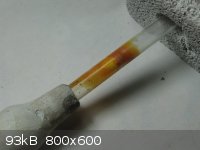| Pages:
1
..
43
44
45
46
47
..
60 |
Nitro-esteban
Harmless

Posts: 39
Registered: 10-4-2013
Location: Fifth dimension
Member Is Offline
Mood: inert
|
|
It was just an idea... but I think its worth trying.
|
|
|
Zachemophile
Harmless

Posts: 3
Registered: 15-7-2013
Member Is Offline
Mood: No Mood
|
|
Direct Reduction of Phosphorus pentoxide to P4, possible?
I would like to experiment with WP but I know the inherent difficulties of getting my hands on the stuff. Due to its use as a stand alone reducing
agent in methamphetamine production it is not easily available in the modest quantity I would like. One option would be to obtain it from thermal
decomp of red P, but this reagent is just as controlled for the same reasons. I have no intentions of converting cold pills to crank, but I'm sure
they won't take my word for it.
As an alternative I have mulled over the idea of reducing the easily obtainable phosphorus pentoxide to condensable P4.
What dyu guys think? Id like to have a few pointers from more experienced chemist before I get started so that I don't waste my time / risk my life on
procedures that won't work or will leave me severely injured.
Would LAH work as a reducing agent, or maybe Na + H2 (I think I would use amalgam rather than the pure metal)?
I'v heard carbon could work, in a kind of smelting type reaction, but I don't want to go anywhere near high temperatures when it comes to Willy Pete.
I realize the final product would contain quite a bit of oxide impurity, but I think I could get rid of most of it with a chromic acid treatment
(although I've read from someone else's post that nitric would work the same or even better). Or should I condense it directly into acid solution?
Am I insane for even thinking this is possible? I've toyed with the idea of attempting the industrial kiln method of production (calcium phosphate,
silicon dioxide, carbon and HIGH temperatures) but I'd rather not blow up.
Anyway just a little brain teaser for those of you that would appreciate a possibly easy way of producing WP at home or in the lab. If your advice is
good I might live long enough to post my findings.
|
|
|
blogfast25
International Hazard
    
Posts: 10562
Registered: 3-2-2008
Location: Neverland
Member Is Offline
Mood: No Mood
|
|
Check out the sticky thread above.
BTW: in all likelihood: 'No heat? No phosphorus'.
|
|
|
bfesser
|
Threads Merged
15-7-2013 at 11:28 |
Zachemophile
Harmless

Posts: 3
Registered: 15-7-2013
Member Is Offline
Mood: No Mood
|
|
I would like to experiment with WP but I know the inherent difficulties of getting my hands on the stuff. Due to its use as a stand alone reducing
agent in methamphetamine production it is not easily available in the modest quantity I would like. One option would be to obtain it from thermal
decomp of red P, but this reagent is just as controlled for the same reasons. I have no intentions of converting cold pills to crank, but I'm sure
they won't take my word for it.
As an alternative I have mulled over the idea of reducing easily obtainable phosphorus pentoxide to P4.
What dyu guys think? Id like to have a few pointers from more experienced chemist before I get started so that I don't waste my time / risk my life on
procedures that won't work or will leave me severely injured.
Would LAH work as a reducing agent, or maybe Na + H2 (I think I would use amalgam rather than the pure metal)?
I'v heard carbon could work, in a kind of smelting type reaction, but I don't want to go anywhere near high temperatures when it comes to Willy Pete.
Am I insane for even thinking this is possible?
|
|
|
bfesser
Resident Wikipedian
    
Posts: 2114
Registered: 29-1-2008
Member Is Offline
Mood: No Mood
|
|
Wasting LiAlH<sub>4</sub> on isolating P? I don't even...
<img src="http://time2breakup.files.wordpress.com/2013/07/annoyed-facepalm-picard-l.png" width="300" />
Why don't you just read though this thread before posting strange ideas that likely won't work?
[edit]
Also, if you're going to continue saying things like "Willy Pete," we'll assume you're just a cook looking to be spoon-fed and your posts will be
ignored or removed.
[Edited on 7/15/13 by bfesser]
|
|
|
Magpie
lab constructor
    
Posts: 5939
Registered: 1-11-2003
Location: USA
Member Is Offline
Mood: Chemistry: the subtle science.
|
|
May I ask in what country (or continent) you live?
The single most important condition for a successful synthesis is good mixing - Nicodem
|
|
|
Endimion17
International Hazard
    
Posts: 1468
Registered: 17-7-2011
Location: shores of a solar sea
Member Is Offline
Mood: speeding through time at the rate of 1 second per second
|
|
IIRC, WP has nothing to do with metamphetamines. It's pretty useless for such things partially due to reason it's violently reactive.
It's RP together with iodine that's used to make HI in situ for various organic reactions (I think; I really never bothered to search on how
to cook drugs), and while you can get small lumps of WP by thermal conversion and meticulous purification from RP, you can't really get RP from WP
that easy.
In that regard, WP is less interesting to cooks, but it's also not very interesting to most k3wls as it's not something you can easily get and then
force to react in a spectacular fashion without seriously jeopardizing health. It's more of a curious allotrope that glows in the dark and can make
your life pretty miserable if you don't handle it with care. It's kind of like Gollum's precious. 
But yeah, you won't get any allotrope unless you use heat, lots of it. There still isn't a process out there that is similar to the, now famous among
amateurs, isolation of potassium without the whole mess.
Some things are still basically the same as when invented. Aluminium and phosphorus production, for example.
May I suggest reading at least 25% of this thread? It should not be that hard.
|
|
|
AndersHoveland
Hazard to Other Members, due to repeated speculation and posting of untested highly dangerous procedures!
    
Posts: 1986
Registered: 2-3-2011
Member Is Offline
Mood: No Mood
|
|
I had an idea. What if we reduced sodium phosphate with zinc powder in a closed iron container over flame. This would form zinc phosphide. Cautiously
remove the residue, place in an enclosed flask with sealed tubing, add hydrochloric acid, and pass the resulting PH3 gas into a solution of FeCl3.
This might oxidize the phosphine to phosphorous, though I do not know. I am not sure what other reaction could happen.
|
|
|
zed
International Hazard
    
Posts: 2283
Registered: 6-9-2008
Location: Great State of Jefferson, City of Portland
Member Is Offline
Mood: Semi-repentant Sith Lord
|
|
Zachemophile,
The production of Red Phosphorus, via the reduction of phosphates via LiAlH4, has been reported on......here. As I recall, there is some, but too
much information in the literature about it. Anyway, reputedly, it can be done.
Quite likely, if the reduction can be performed with LiAlH4, it can also be performed with NaAlH4. If you have a Parr-type pressure reactor, NaAlH4
can be produced. (And, if required, that material can be used to produce LiAlH4.)
|
|
|
AndersHoveland
Hazard to Other Members, due to repeated speculation and posting of untested highly dangerous procedures!
    
Posts: 1986
Registered: 2-3-2011
Member Is Offline
Mood: No Mood
|
|
I wonder... do you think it might be possible to reduce triethyl phosphate dissolved in ether with aluminum foil, by passing anhydrous HCl gas into
the solution?
Afterwards, hydrolyze the ester to phosphorous acid, which might then be easier to further reduce than the phosphate. Woelen remarked something about
this in another thread:
Quote: Originally posted by woelen  | Indeed, the highest oxidation state salts and acids usually are much less reactive than the salts (and acids) of lower oxidation states:
- nitrite is more reactive than nitrate
- sulfite is more reactive than sulfate
- chlorate is much more reactive than perchlorate
- bromate is more reactive than perbromate
- phosphite is more reactive than phosphate, although the difference is less than with the other examples above.
|
As an example, nitrite can act as either an oxidizing agent or reducing agent, it is fairly reactive. Sulfur dioxide typically acts as a reducing
agent, but can readily oxidize H2S.
I wonder if it might be easier to reduce phosphite also.
[Edited on 16-7-2013 by AndersHoveland]
|
|
|
Nitro-esteban
Harmless

Posts: 39
Registered: 10-4-2013
Location: Fifth dimension
Member Is Offline
Mood: inert
|
|
Perhaps phosphorus can be obtained from malathion.
|
|
|
testimento
Hazard to Others
  
Posts: 351
Registered: 10-6-2013
Member Is Offline
Mood: No Mood
|
|
For all the chit-chat, it doesn't seem to be impossible to perform the industrial process in small scale:
2 Ca3(PO4)2 + 6 SiO2 + 10 C → 6CaSiO3 + 10 CO + P4
700g Calcium phosphate + 360g silicon dioxide + 120g carbon → 30 grams of phosphorus
Oh dear, heating a kilogram buttload of waste soil up to 1500C all only just for a neatly 30 grams of white waxy accumulant? Bring that all way up to
100 kilograms for getting only 3kg out? Aww f*....
Another source cites using microwave at 540C - possibly manageable with conventional heating too:
1 4H3PO4 + 16C → 6H2 + 16CO + P4
98g phosphoric acid + 192g carbon → 30 grams of phosphorus
I remember seeing a 25-liter trunk of decent quality phosphoric acid in some sort of cleansing ware shop so whenever I'd have a need for some
phosphorus, I might give it a shot and let you know.
[Edited on 29-9-2013 by testimento]
|
|
|
elementcollector1
International Hazard
    
Posts: 2684
Registered: 28-12-2011
Location: The Known Universe
Member Is Offline
Mood: Molten
|
|
Quote: Originally posted by testimento  | For all the chit-chat, it doesn't seem to be impossible to perform the industrial process in small scale:
2 Ca3(PO4)2 + 6 SiO2 + 10 C → 6CaSiO3 + 10 CO + P4
700g Calcium phosphate + 360g silicon dioxide + 120g carbon → 30 grams of phosphorus
Oh dear, heating a kilogram buttload of waste soil up to 1500C all only just for a neatly 30 grams of white waxy accumulant? Bring that all way up to
100 kilograms for getting only 3kg out? Aww f*....
Another source cites using microwave at 540C - possibly manageable with conventional heating too:
1 4H3PO4 + 16C → 6H2 + 16CO + P4
98g phosphoric acid + 192g carbon → 30 grams of phosphorus
I remember seeing a 25-liter trunk of decent quality phosphoric acid in some sort of cleansing ware shop so whenever I'd have a need for some
phosphorus, I might give it a shot and let you know.
[Edited on 29-9-2013 by testimento] |
In case the carbon isn't quite enough to bring the reaction up to the desired heat, one could always use silicon carbide powder from a rock shop.
The only problem I can see is the CO - what on earth would you do to get rid of that? Leave oxygen in the reactor to turn it into relatively harmless
CO2?
Also, could I request that source?
[Edited on 1-10-2013 by elementcollector1]
Elements Collected:52/87
Latest Acquired: Cl
Next in Line: Nd
|
|
|
12AX7
Post Harlot
    
Posts: 4803
Registered: 8-3-2005
Location: oscillating
Member Is Offline
Mood: informative
|
|
CO would pass the condenser, at which point it could be flared off (along with any pesky P4 / PHx fumes), or just vented.
CO burns easily in air, sustaining a dim blue flame.
Tim
|
|
|
Metacelsus
International Hazard
    
Posts: 2539
Registered: 26-12-2012
Location: Boston, MA
Member Is Offline
Mood: Double, double, toil and trouble
|
|
Quote: Originally posted by testimento  |
2 Ca3(PO4)2 + 6 SiO2 + 10 C → 6CaSiO3 + 10 CO + P4
700g Calcium phosphate + 360g silicon dioxide + 120g carbon → 30 grams of phosphorus
|
What if you used sodium hexametaphosphate (empirical NaPO3)?
4 NaPO3 + 2 SiO2 + 10 C → Na2SiO3 + 10 CO + P4
408 g NaPO3 + 120 g silicon dioxide + 120 g carbon → 30 grams phosphorus
As to the CO, can't you absorb it in concentrated NaOH solution to get sodium formate?
[Edited on 1-10-2013 by Cheddite Cheese]
[Edited on 1-10-2013 by Cheddite Cheese]
|
|
|
learningChem
Hazard to Others
  
Posts: 182
Registered: 21-7-2011
Member Is Offline
Mood: No Mood
|
|
According to Mellor, phosphoric acid is reduced with carbon in fireclay retorts "heated to redness".
What temperature would that be in celcius?
|
|
|
12AX7
Post Harlot
    
Posts: 4803
Registered: 8-3-2005
Location: oscillating
Member Is Offline
Mood: informative
|
|
Around 700-800C (think MP of aluminum).
Tim
|
|
|
plasticraincoat1
Harmless

Posts: 7
Registered: 5-10-2013
Location: Ireland
Member Is Offline
Mood: 
|
|
I have some yellow phosphorus for sale if any one is interested.
plasticraincoat
|
|
|
testimento
Hazard to Others
  
Posts: 351
Registered: 10-6-2013
Member Is Offline
Mood: No Mood
|
|
Quote: Originally posted by elementcollector1  | The only problem I can see is the CO - what on earth would you do to get rid of that? Leave oxygen in the reactor to turn it into relatively harmless
CO2?
Also, could I request that source? |
Presuming the CO won't react the gas phase / solidified phosphorus, it will be bubbled out of the reaction through the water trap, and it can be
vented via tube outside, ejected via exhaust fan or directed into a separate burner air intake to be burned.
I remember this was actually cited in this very topic in some form of patent which dictated that reaction scale.
https://en.wikipedia.org/wiki/Black-body_radiation
http://911research.wtc7.net/cache/wtc/analysis/fires/metcolo...
http://physics.info/color/ (this one has excellent chart)
The black-body radiation is explained in this article, including the temperature color indicators. It seems to be the most common method of showing up
the temperature chart since few people have access to high-temp thermoprobes, allowing them to actually measure the reaction temps anything in excess
of 350C where conventional mercury thermometers compete.
[Edited on 9-10-2013 by testimento]
|
|
|
learningChem
Hazard to Others
  
Posts: 182
Registered: 21-7-2011
Member Is Offline
Mood: No Mood
|
|
reduction of metaphosphoric acid
I used a ceramic retort loaded with some 2 grams of metaphosphoric acid and carbon (burnt flour). There's phosphorous coating the glass tube but the
yield was almost nothing.

|
|
|
learningChem
Hazard to Others
  
Posts: 182
Registered: 21-7-2011
Member Is Offline
Mood: No Mood
|
|
pics
 
|
|
|
Dr.Felix Strausser
Harmless

Posts: 11
Registered: 15-11-2013
Location: Peenemünde
Member Is Offline
Mood: Monoclinic
|
|
A simple way to obtain a SAMPLE of white phosphorus is by scraping out the (impure) mixture of red phosphorus from the sides of matchboxes (or if you
can obtain pure red P4 just as good). Now put the red P4 in a testube whose mouth has been firmly sealed with a piece of cotton. Take this apparatus
and heat lightly for a few moments until you see a white-yellow substance condensing on the cotton. Voila, white phosphorus.

|
|
|
woelen
Super Administrator
        
Posts: 8012
Registered: 20-8-2005
Location: Netherlands
Member Is Offline
Mood: interested
|
|
Please post useful info or do not post at all. Your last post about boiling piss does not add anything to this thread, it just derails it and makes
you look like a k3wl.
|
|
|
elementcollector1
International Hazard
    
Posts: 2684
Registered: 28-12-2011
Location: The Known Universe
Member Is Offline
Mood: Molten
|
|
Quote: Originally posted by learningChem  | I used a ceramic retort loaded with some 2 grams of metaphosphoric acid and carbon (burnt flour). There's phosphorous coating the glass tube but the
yield was almost nothing.
|
You know, looking at this I'm tempted to see what happens if you scale it up. The setup is fine, but the yield is, as stated, very low. The maximum
possible yield of phosphorus from a mixture of (assuming) 1.3g H3PO4 and 0.7g C would be about 0.41g phosphorus, and because you didn't use vacuum or
inert gas, your yield is likely much lower than that. So, if you scale it up to 50g phosphoric acid and 25g carbon, and assume a yield of 10% (a
reasonable, if low assumption IMO), your expected yield would be 1.6g of phosphorus.
Elements Collected:52/87
Latest Acquired: Cl
Next in Line: Nd
|
|
|
bismuthate
National Hazard
   
Posts: 803
Registered: 28-9-2013
Location: the island of stability
Member Is Offline
Mood: self reacting
|
|
What was the heat of your reaction.
Also would this be a viable route (it seems to simple)
PH3+3NH3==>(NH4)P
and then decompose the ammonium phosphide (I cant find if it does decompose, but it seems likely)
|
|
|
| Pages:
1
..
43
44
45
46
47
..
60 |